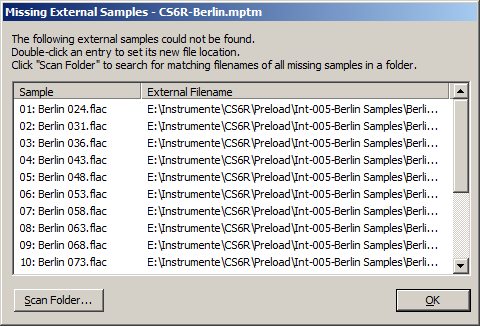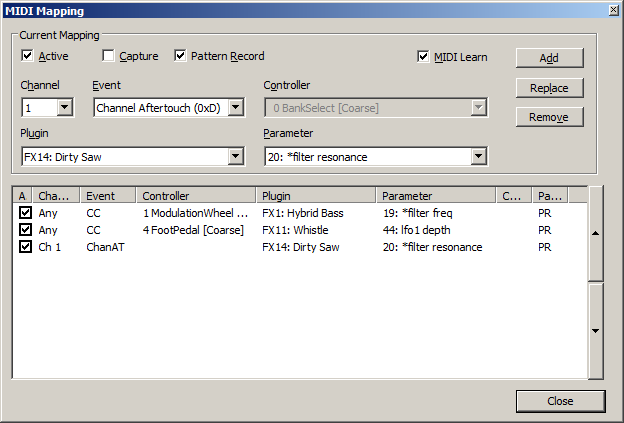 OpenMPT 1.24 - Release Notes
OpenMPT 1.24 - Release Notes
It's been a while since the last official release (version 1.23.05.00), and we have been working on a bunch of great new features for this new version.
This document should give a rough overview about the greatest changes in OpenMPT 1.24.
What's new?
General


- ITP is dead, long live MPTM! No worries, your old ITP files can still be imported, but the clunky ITP format has been dropped in favour of some new features in the MPTM format: Instead of instruments, you can now keep references to external samples in your MPTM files, effectively reducing the file size even if a sample is shared by several instruments. The ITI instrument format has been extended in a similar way so that ITI files can now simply reference external sample files instead of directly embedding the sample data. Unlike in the ITP format, it is easy to mix external and internal samples in one file and relocate missing files.
- Each song's window position and contents are now saved, so that you can continue right where you left off when reloading the file.
- "Remove unused sample data" now also finds samples with identical stereo channels and offers to optimize them to mono.
- Dropping a folder on OpenMPT that contains modules or VST plugins opens / registers them directly now.
- Song length estimation can now show the length of all "hidden" subtunes in the current sequence.
- Many small improvements in the audio output code again, also to improve performance on Wine systems.
- Made the MIDI Mapping dialog's mapping list more human-readable.
- New fade curves in pattern and sample amplification dialog: Exponential, Logarithmic, Square Root, Quarter Sine, Half Sine.
- Greatly improved seek performance when "Maintain sample sync on seek" is enabled.
- The MPTM volume column offset command has been revamped: 9 custom cue points can be selected for each sample in the waveform's context menu, which can then be triggered using
o01
...o09.
Pattern Editor
- Custom pattern fonts can now be used. The built-in fonts can also be zoomed in for High-DPI devices.
- Ctrl+(Shift+)Scroll wheel can now be used as a replacement for the "(Coarse) Data Entry" shortcuts.
- Can now transpose a whole channel in all patterns via the channel header context menu.
- No longer mark module as modified when switching between sequences.
- When jumping around in the order list, panning, parameter extension (#xx), and tempo / volume slides that are on the same row as a set speed effect are now applied properly.
Tree view
- Further enhanced drag&drop functionality: Dropping a module or folder on the sample browser opens this module or folder for browsing, dropping a soundfont file on the upper part of the tree view adds it to the list of soundfonts.
- Due to the change from external instruments in the ITP format to external samples in MPTM, "Set Path" and "Save" have been moved to samples. External samples are marked with [external], missing external samples are marked with [missing].
- Sample waveforms can now be reloaded from disk (e.g. after editing a sample in an external application) if OpenMPT knows the sample's original path, e.g. after loading or saving it, or using MPTM's external sample feature.
Plugins
- When adding a new plugin through the plugin manager that is missing from some open file, it is now automatically loaded and restored in that file.
- "Randomize Parameters" now applies a customizable randomization factor - much more useful than completely random parameters.
- Plugin editors now have minimize / maximize buttons, which can be used to shrink a plugin window to only display the title and menu bar.
Sample Editor
- Resampling to any custom sample rate is now possible, thanks to the high-quality r8brain-free resampler.
- Adjusting the sample frequency updates all playing notes' sample frequency immediately (only in IT and MPTM).
- Custom background and selection colours.
- Rearranging samples (e.g. through song cleanup or the tree view) no longer messes up the undo buffer history.
- Crossfader can now use constant power (instead of constant volume) fade law for even smoother loop transitions. The sample can now optionally be faded back to its original content after the loop end.
- Middle-C finetune adjustments are now made in cents (1/100th of a semitone) instead of Hertz.
Instrument Editor
- ITI instrument files can now contain external samples (like MPTM files, see above). Select "Impulse Tracker Instruments with external Samples" from the save dialog.
- When previewing instruments with a fadeout value of 0, instantly stop them on key-up instead of letting them play forever.
- The first instrument of a soundfont can now be loaded directly without registering the soundfont in OpenMPT. Useful for single-instrument soundfonts.
- Can now load and save instrument envelopes independently from whole instruments.
- Apply DNA and NNA settings to released notes when previewing notes.
Playback
A couple of playback behaviours have been changed and improved:
- S70 / S71 / S72 commands do now also work with instrument plugins. NNA / DCA settings are now applied to plugins assigned to sample-less instruments as well.
- Smooth MIDI macros do now, to some extent, work with external MIDI messages. They interpolate from the previous Zxx or \xx parameter from the same channel to the new parameter.
- In all mix modes since 1.17RC2, a way too long volume ramp (some times up to 100 times longer than the user-supplied ramp setup) was applied for extreme global volume changes. This is now disabled except for legacy 1.17RC2 mix mode.
- Re-implemented stereo separation to be applied on the master mix. This means that it also works as expected with stereo samples and plugins now.
- Linear frequency slide mode (in all formats except XM, which already worked as intended) has been re-implemented to fix some unwanted inaccuracies which can add up very quickly when using extra-fine slides.
- Support for ProTracker oneshot loops in ProTracker 1/2 mode: If the loop start is right at the start of the sample, play through the whole sample once and then repeat just the loop part.
File Format Support
- Reverted XM compatibility export to always write out 256 order items, which should restore compatibility with a couple of players that were previously choking on OpenMPT's XM files.
- Use "normal" compatible mix mode instead of FT2 panning mix mode for XM files that were compatibility-exported with OpenMPT 1.22 or older, and XM files made with other trackers that use linear panning.
- Compatible playback mode for S3M: When enabled, OpenMPT emulates certain ScreamTracker quirks as it did until now (linked pattern effect memory and ignored effects on muted channels). Compatible mode is disabled automatically for files made with less compatible trackers. S3M files made with OpenMPT always have this mode enabled, and its state is not saved in S3M files.
- Amiga frequency limits can now also be enforced in MOD files without activating ProTracker 1/2 mode.
- Added loading support for a MOD variant introduced by SoundTracker 2.6 and Ice Tracker and the PLM (Disorder Tracker 2) format.
- Completely rewrote MT2 loader. Some files that would previously not load properly do now load. Support for VST plugins, drum patterns and some extended MT2 pattern commands has been added.
There's more...
For a detailed description of what has changed, check History.txt. If you are new to OpenMPT, be sure to read the manual as well.
Known Issues
This list has mostly been copied over from the old OpenMPT 1.17 RC2 release notes, so this not very comprehensive... :-)
- The plugin bridge is new and hasn't been tested very much yet. It is known that some plugins don't work in it at all. Custom plugin GUIs are known to not work in Wine. Please report any other issues you may be having with the plugin bridge!
- Far from perfect VST support (no buses for audio / MIDI routing, only a few tracker effects are supported, etc...)
- Previewing samples from the tree view's file browser stops the playing module.
- Cannot preview soundfont instruments directly from the MIDI Library in the tree view.
- Excessive performance drop when dragging over the graphical parameter editor during playback.
- The Right Alt (or Alt Gr) key is not handled well by the keyboard configuration.
- There is no really convenient way to find out what features of the tracker are supported by the original trackers (Impulse Tracker, Fasttracker 2, etc...) when working with those file formats...
Contact
Helpful bug reports, new ideas and brave volunteers to test early development builds or contribute to the code are more than welcome!
Our issue tracker is located at http://bugs.openmpt.org/ and can be used to report bugs and feature requests.
You can also meet us at the ModPlug Central forums: http://forum.openmpt.org/.
 OpenMPT 1.24 - Release Notes
OpenMPT 1.24 - Release Notes
 OpenMPT 1.24 - Release Notes
OpenMPT 1.24 - Release Notes